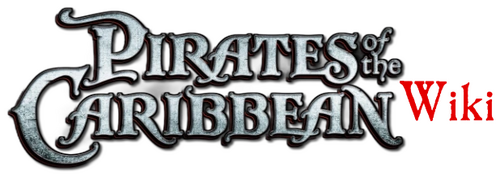- "Beckett?"
"Yes, they are signed: Lord Cutler Beckett of the East India Trading Company."
"Bleh!" - ―Joshamee Gibbs, Elizabeth Swann and Jack Sparrow
Cutler Beckett was a loyal subject of the British Empire as well as a senior officer of the East India Trading Company. Ambitious, cold-blooded and utterly ruthless, Beckett was a man with a mission and would do whatever he thought was necessary to achieve his goal. As supreme head of the East India Company, he made it his duty to fill in the blank areas on the world map. To further his achievements, Beckett aimed to rid the Seven Seas of pirates and end the Age of Piracy.
Born and raised in a prosperous merchant family in England, Cutler Beckett joined the East India Company after a fight with his father. For many years he faithfully served the Company, eventually becoming the Director of West African Imports and Exports for the Company. From his post in Calabar, the Director of West African Affairs organized a search for the mythical island of Kerma, hoping to find its legendary treasure. However, the quest for Kerma didn't succeed because Beckett was betrayed by Captain Jack Sparrow, the merchant seaman he trusted enough to place him in charge of his own ship, the merchantman Wicked Wench. Not only did Sparrow not bring Beckett the bearings of Kerma, but Sparrow also liberated a cargo of slaves which Beckett's patron Lord Penwallow needed for his plantation in the Bahamas. Since Sparrow's act ruined his chance to join the British nobility, Beckett ordered his men to burn the Wench and personally branded Sparrow as a pirate. Though his quest for a title was delayed, Beckett nonetheless continued to work for the Company.
Years after the burning of the Wicked Wench, Cutler Beckett was granted the title of Lord, eventually becoming a senior officer and supreme head of the East India Trading Company as well as duly appointed representative of King George II. Mean-spirited and arrogant, Beckett was rarely seen without his merciless enforcer, Ian Mercer. With his newly appointed powers by the Royal Commission for Antilles Trade and Protection, Lord Beckett oversaw the expansion in the Caribbean, but he knew that he can make no progress until he had stamped out the scourge of piracy. To further the achievements of the company, Beckett set his sights on finding the fabled Dead Man's Chest; whoever possessed the chest controls the sea. Lord Beckett timed his arrival in Port Royal so that he would interrupt William Turner and Elizabeth Swann's wedding, arresting the two for aiding in the escape of Captain Jack Sparrow, then offered a pardon and letters of marque for Jack in exchange for Jack's Compass. However, while Beckett intended to use the compass to lead him straight to the chest, the heart of Davy Jones was presented to Beckett by James Norrington, former commodore of the Royal Navy.
Having acquired the heart of Davy Jones, Lord Cutler Beckett had gained control of the terrifying ghost ship, the Flying Dutchman, and he intended to use this power to destroy every last pirate of the Caribbean once and for all. He knew the Pirate Lords of the legendary Brethren Court would gather as the only hope to defeat Beckett and the Dutchman. From aboard his flagship, the Endeavour, Cutler Beckett made shaky alliances and various bargains with Sao Feng, Jack Sparrow, and Will Turner during the war against piracy. Knowing the Brethren may not be enough to hold back the fearsome tide of his powerful Armada, Beckett prepared for a final stand. Following a titanic battle between the Black Pearl and the Flying Dutchman, which saw the death of Davy Jones and Will Turner becoming the new captain of the Dutchman, both ships attacked the Endeavour, resulting in Beckett's death and the downfall of the East India Trading Company in the Caribbean.
Biography[]
Early life[]
Springhaven[]
- "Are you all right, young Master Beckett?"
"Yes, schoolmaster. I would just like to finish reading this chapter you assigned, please."
"Of course, laddie. ’Tis a pleasure to have a student who loves his book." - ―Angus MacFarlin and Cutler Beckett
Cutler Beckett was born in the wealthy Beckett family in the county of Somersetshire in Southern England. When he was born, he was a small, sickly baby that no one expected to survive, but he surprised his family by living. He spent his youth on the family's estate of Springhaven. Cutler's father, Jonathan Beckett Sr., was the director of the Beckett Trading Company, one of the top five merchant companies in England.[3]
From his earliest years, Cutler Beckett was fascinated with books and learning. Unlike his older brothers, Jonathan Jr. and Bartholomew, who struggled to master enough mathematics to handle accounting, and enough reading and writing to be able to write confidential business letters in a clear hand, Cutler soon evidenced significant aptitude as a scholar. The subjects that fascinated him were numerous: history, geography, and the classics written in their original Greek and Latin.[3]
By the age of eight, Cutler Beckett was far better student than his classmates, the sons of local nobles. However, his success also sparked jealousy and hatred among other children who considered him the teacher's pet who always made them look bad. After an ugly incident in which Cutler was brutally beaten by his classmates, his teacher Angus MacFarlin decided to give him private tutoring lessons. MacFarlin, who liked Cutler's imagination, gave him a copy of an interesting book, My Lyfe Amonge the Pyrates, written by Captain J. Ward, a man who was believed to be a pirate himself. Full of stories about the adventures on the high seas, the book sparked young Cutler's interest in treasure and the supernatural. One of Cutler's favorite legends in the book was the legend of Zerzura, the Shining City, located on the island of Kerma. According to Captain Ward's book, the island was hidden from the outside world by a magical fog and inhabited by the descendants of the Kushites who had left Egypt and Kush thousands of years earlier.[3]
For the next few years, Cutler enjoyed in MacFarlin's private lessons, accompanied by his older sister Jane. However, the one thing Cutler still couldn't gain was the respect and love from his father Jonathan. His father and his brothers looked at him like an unwanted mouth they had to feed. Only his sister Jane and his sickly mother showed him love. Wanting to make his father proud of himself, young Cutler decided to become a general or an admiral, a man who would be called "Sir" one day. He believed that his father would show him some respect if he acquired a title, the one thing no Beckett before ever had.[3]
Leaving his home[]
- "Cutler, your mother has a wasting disease. Some kind of unknown ailment the doctors can't diagnose or cure. She's dying, boy. Seeing you settled as a clergyman is her last wish."
"How dare you try to use my mother to manipulate me, you devil? A ‘wasting disease’ is it? An ‘unknown ailment?’ You lying, filthy hypocrite! I know what's wrong with my mother, and so do you! She has the damned pox, and you gave it to her! Why it hasn't brought you down yet, I don't know, but if I believed, I'd pray every day that it would!" - ―Jonathan Beckett Sr. and Cutler Beckett
By the age of eighteen, Cutler was well educated. He had studied the works of Isaac Newton, and he wanted to become a professor. With his knowledge, he knew he would be accepted at Cambridge or Oxford. But before settling as a professor, he wanted to see the world.[16]
One day, his father asked him what would he like to do with his life. Knowing that he had a "head for business", Cutler responded that he would like to join his brothers in the Beckett Trading Company. But Jonathan Beckett had a different opinion, believing that Cutler would never be suitable for service to the king, and he wanted Cutler to become a clergyman instead, saying that he had made "an investment" in a nice vicarage for him.[16]
However, Cutler refused his father's offer, knowing that he wouldn't be a good priest, as he didn't believe in God at all. But then Jonathan said to Cutler how his mother was very sick, and that her last wish was to see him settled as a clergyman. When he heard that, Cutler had a burst of rage, accusing his father of infecting his mother with a pox after sleeping with dozens of prostitutes on his night outs. After saying to his father that he despised him, Cutler decided to leave his family's home the same day. Jane heard Cutler's conversation with their father, and though she couldn't come with him immediately, she gave him her entire life savings, so he could send for her once he was settled somewhere.[16]
East India Trading Company[]
Early career[]
- "Sir... I would like to take the liberty of formally thanking you once again, this time in person, for your rescue of me ten years ago. To put it bluntly, you saved my life, when my family refused to come to my rescue, in effect casting me off. If it were not for your order that resulted in my being freed, I shudder to think what would have happened to me."
- ―Cutler Beckett to Reginald Marmaduke Bracegirdle-Penwallow
After packing his bags, young Cutler headed for London, the capital of Great Britain, where he found employment in the East India Trading Company. Cutler worked at the London EITC Office for several months, proving himself to be a good executive. One day, Cutler's superiors assigned him to a tour of duty at the EITC office on Gibraltar. He quickly boarded the merchantman Lindesfarne in London, hoping to finally fulfill his ambition of seeing the world.[12]
However, during the journey, off the coast of Spain, the Lindesfarne was captured by the pirate ship Le Requin, captained by the Frenchman Christophe-Julien de Rapièr. Cutler unwisely angered the pirate captain, telling him that his fancy clothes were out-fashioned in both London and Paris. The pirate captain did not like Cutler's attitude so he allowed his crew to "play" with the youngster, and they tortured him for days. While waiting for the ransom money, the pirate crew forced Cutler and other prisoners to clean their ship; whipping them if they didn't do their work well. Still furious at his son, Jonathan Beckett Sr. refused to pay the ransom, and the young boy decided to commit suicide, rather than spend the rest of his life as a slave. However, at at the last moment the EITC official Reginald Marmaduke Bracegirdle-Penwallow sent a modest ransom for Cutler, and Captain de Rapièr freed the boy. The experience in captivity left Cutler with eternal hatred for pirates.[12]
New assignments[]
- "The EITC invested a goodly sum in me, a new and unproven employee, and it happened all by your order. I have always endeavored to make sure the company has been well repaid for its investment, my lord."
"Pish and tosh, Beckett! You repaid the EITC its actual outlay within a remarkably short period of time, and since then, you have been responsible for numerous profitable ventures, too many to detail." - ―Cutler Beckett and Reginald Marmaduke Bracegirdle-Penwallow
When he reached Gibraltar, the first thing Cutler Beckett did was writing a letter to the EITC official, Lord Penwallow, thanking him for the EITC's faith in him, and promising to pay back the ransom amount. Following his return to England, Beckett continued his work for the Company, spending some time at the EITC office in Bristol. Over the years, Beckett rose rapidly through the EITC ranks, and he was eventually sent to the Far East to work for the EITC branch in Nippon at the port of Edo.[3]
For all these years, Cutler stayed in contact with his sister. Now that he was well established, he wanted her to join him, but he couldn't ask her to travel to the other side of the world, a voyage that would take at least six months. When he learned from Jane that their mother was dead, he promised her that she could join him at his next posting.[3]
Over the years, Beckett employed many operatives, men in important foreign ports who kept an eye on developments and reported to him. He had a web of spies funneling him information at all times. A man named Gates, a former spy for the British Crown, served as Beckett's eyes and ears in the seamier sections of Edo. More than a few of Gates' assignments involved violence, either covert or overt.[3]
EITC Director[]
- "You have done very well, Beckett, very well indeed, at outfitting your home. You have some lovely things."
"I try to keep my living arrangements...civilized...my lord, no matter where the EITC sends me. Since I plan a lifetime of service, it is well to have the ability to make a home anywhere."
"Excellent, excellent, Beckett! It is good to hear that you plan to stay with us. Your work has been exemplary to date." - ―Reginald Marmaduke Bracegirdle-Penwallow and Cutler Beckett
After working for three years in Nippon, Beckett was relocated to Calabar in West Africa, where he became the Director of West African Affairs for the East India Trading Company. When he came to Calabar, Beckett immediately hired Ian Mercer, a professional spy and a killer for hire, to replace Gates who was killed on a mission in Nippon.[3]
Immediately after he arrived at his new post, Beckett received a letter from his cousin Susan in which she informed him that his sister had died from a fever.[3] Coldhearted as he became, he didn't mourn her death, because he had more important things to do. He was already rich and powerful, and the only thing he wanted now was a title, so he could briefly come to Somersetshire, see his father, and then give him the “cut direct,” the worst insult high society allows.[3]
It didn’t take Beckett long to adjust to the demands of his new job, and to ensconce himself in the European community that was growing in Calabar. Soon, Beckett involved himself in a brisk side business in light-skinned female concubines for a few of the wealthy and powerful gentlemen in Calabar. He also did "favors" for powerful men, asking for no payment. He knew that having wealthy, powerful men that owed him, that required his discretion and continuing silence, often paid off in many ways.[3]
A few months after he arrived to his new post, Beckett was visited by his immediate supervisor, the EITC's Director of African Affairs, Viscount, Lord Reginald Marmaduke Bracegirdle-Penwallow. For the next ten days, Lord Penwallow stayed in Calabar as Beckett's personal guest. During that time, Penwallow told him of his contacts at the Court of King George and the EITC top management. When Lord Penwallow finally departed, Beckett knew that Penwallow might be his ticket to a title.[3]
Quest for Kerma[]
Meeting Jack Sparrow[]
- "Good morning, gentlemen. I am Cutler Beckett, Director of West African Imports and Exports for the East India Trading Company. And whom do I have the pleasure of welcoming today?"
"Good morning, Mr. Beckett, sir. I'm First Mate Jack Sparrow, and this is my second mate, Robert Greene. We just arrived back in Calabar aboard Fair Wind, and knew it was our duty to come up to the office and report in." - ―Cutler Beckett and Jack Sparrow
At some point during his directorship, Beckett bought an old ship, the Wicked Wench. Though he wanted to use her as a slave ship at first, the shipwrights told him that converting her hold to haul slaves would be expensive, so he decided to use her for hauling other cargoes.[3]
One day, when the EITC brig Fair Wind arrived at Calabar, Beckett was visited by the ship's first and second mate, Jack Sparrow and Robert Greene, instead of the ship's captain, Nathaniel Bainbridge. The officers told him that the Fair Wind was attacked by the pirate frigate Venganza in the Caribbean, and that the captain died from an apoplexy when he tried to attack the pirate captain, a woman called Doña Pirata, because he couldn't stand the idea of a woman commanding a ship. Sparrow and Greene also told him that Jack parleyed with Doña Pirata and that she agreed to take only one third of the ship's cargo of rum.[3]
One day later, after Beckett examined the logbook of the Fair Wind, he invited Sparrow back to his office. Clearly impressed with Sparrow's negotiation skills, Beckett offered him a promotion to the rank of captain, as well as a vessel to command, the brand-new square-rigger named Marlin. Though Sparrow agreed at first, he said no when Beckett told him that the Marlin would be used as a slave ship. Though Beckett agreed that slave trade wasn't a pleasant business, it was extremely lucrative, and he was very surprised with Jack's refusal. However, knowing that Sparrow could be an excellent operative for him in foreign ports, he decided to indulge him, and offered him command of the Wicked Wench, which Sparrow accepted.[3] A few days later, since the Wench needed repairs, Beckett gave Sparrow some funds and allowed him to install two additional twelve-pound cannons, because the ship was woefully under-gunned. Two weeks later, with her cargo hold full, the Wench sailed for the Caribbean.[17]
One day, when the EITC merchant captain informed Beckett about the illegal activities of the EITC's portmaster, Benjamin Blount, Beckett sent Mercer with a group of EITC soldiers to arrest the greedy official. But Blount escaped to the interior of the continent, and was never seen again.[16]
A lunch to remember[]
- "This is Viscount, Lord Reginald Marmaduke Bracegirdle-Penwallow, the EITC's Director of African Affairs."
"It is a pleasure to meet you, Lord Penwallow."
"Thank you, Captain Sparrow, and I must say the pleasure is all mine. It's an honor to meet the captain who so nearly broke the record for sailing the Triangle—and on the vessel's maiden voyage as an EITC ship, too! Well done, well done, Captain Sparrow!" - ―Cutler Beckett, Jack Sparrow and Reginald Marmaduke Bracegirdle-Penwallow
A few months later, Beckett was again visited by Lord Penwallow. By luck, the Wicked Wench docked at Calabar the same day, returning from her first voyage as an EITC ship, and Beckett sent Ian Mercer to bring Jack Sparrow to his house for a lunch with him and Lord Penwallow. He even instructed his housekeeper, Mistress Goodwright, to make sure that Jack baths, for which Beckett provided his own bathtub. He also ordered new, fancy clothes for Jack.[16]
When Jack finally joined Beckett and Lord Penwallow in Beckett's library, they tasked him with transporting some building materials for Lord Penwallow's new plantation house on the island of New Avalon in the Bahamas. During the lunch, it was clear to Beckett's observant eyes that Sparrow had never dined in that style before, but he easily copied Beckett's impeccable table manners, looking more like a gentleman than Lord Penwallow.[16]
Some time after Sparrow departed, Beckett was glad that Lord Penwallow was now even more pleased with his work, and, especially Beckett’s assistance in the matter of his new plantation. Beckett knew it was only a matter of time before the older man would express his gratitude by sponsoring Beckett in his quest for a title.[16]
Soon, Mercer discovered that Jack Sparrow sailed from Calabar with Benjamin Blount's runaway slave Chamba aboard his ship. He informed Beckett of his discovery, but that only convinced Beckett how clever and audacious Jack is and how good an agent he could be for him.[16]
Purchasing a slave[]
- "Master has sold you, Ayisha. I'm sorry to see you go, but it can't be helped. Go and gather your things, then come back here immediately. Don't dawdle."
"Hallo, Ayisha. My name is Cutler Beckett, and I am your new master. I can't wait till we can have a nice, long talk." - ―Mistress Dalton and Cutler Beckett to Ayisha
One of Beckett's hobbies was collecting antique artifacts belonging to past civilizations. When he sent Mercer to search for such artifacts, the assistant returned with the Portuguese who sold stolen goods. Among his merchandise, there were several pieces of gold jewelry of ancient design which Beckett recognized as Kushite. But the jewelry was also extremely similar to the illustrations in the My Lyfe Amonge the Pyrates book. And most importantly, this jewelry wasn't ancient, causing Beckett to realize that the legends about the island of Kerma and the Shining City of Zerzura were true. He immediately bought all the jewelry from the trader, but the Portuguese had to tell him how he got it. When the Portuguese told him that he bought the jewelry from the slave trader known as Ancona Wren-John, Beckett sent Mercer to find that man.[16]
When Mercer found Wren-John, Beckett questioned him about the jewelry. He told them that he found it on some slaves he captured in the interior of Africa. Believing that those slaves came from the island of Kerma, Beckett sent Mercer to find as many slaves from that caravan as possible, and he was able to locate the two of them, an old holy man named Piye and the extremely ugly woman named Ayisha, who was working as a seamstress in the household of Roger Dalton. Though Dalton refused to sell Ayisha when Mercer came to buy her, he agreed when Beckett personally offered him a large amount of money.[18]
When Mercer began to interrogate Piye, the old man died with no apparent reason. Afraid that Ayisha could suffer a similar fate, Beckett didn't allow Mercer to interrogate her. And even without using force on her, they couldn't make her tell them anything useful, because she couldn't speak English, and she looked to be half-witted. Instead, they decided to wait for the return of Jack Sparrow, a man who could seduce her and convince her to give them the bearings of Kerma.[3]
Search for Kerma[]
- "You have my every confidence. As you say, the more she believes you're opposing us, the more she'll trust you. And I'm sure you'll return to Calabar with the bearings for Kerma. You are planning to return, aren't you, Jack?"
"I'll need to return here so we can split up the treasure, Mr. Beckett. I mean... we have a gentleman's agreement." - ―Cutler Beckett and Jack Sparrow
When the Wench returned to Calabar, Beckett again sent Mercer to bring Jack Sparrow to his office. When Sparrow came, Beckett showed him the jewelry he bought and the illustrations in Captain Ward's book. Sparrow instantly recognized the jewelry as Kerman and, like Beckett, noticed that it wasn't ancient. Beckett then told him about the old priest who died and the ugly seamstress Ayisha. When Jack asked about what Beckett wanted him to do, Beckett told him that he should charm Ayisha into telling them where Kerma was. Jack would pretend to help her escape from slavery, take her aboard the Wicked Wench, and when he verifies that the bearings of the island are correct, he would return to Calabar and Beckett would send his fleet to conquer Kerma. In exchange for the bearings of Kerma, Beckett offered him ten percent of the gold that he expected to find on the island. According to legends, the labyrinth beneath Zerzura was full of ancient Egyptian treasure.[19]
However, Jack wanted more than just ten percent, and Beckett then offered him twenty percent of the gold, and ten percent of the slave revenue, because he intended to imprison all the Kermans and sell them as slaves. However, Jack refused to involve himself in slave trade, and Beckett finally agreed to give him thirty percent of the gold. Just to make sure that Sparrow would return, Beckett warned him that if he doesn't fulfill their agreement, and fails to return with both Ayisha and the Wench, which were both Beckett's property, he would be considered a pirate.[19]
Though he believed that Sparrow would return, Beckett ordered Mercer to plant a spy aboard the Wicked Wench. Mercer then hired the carpenter Samuel Newton and sent him to join Sparrow's crew. A few days later, the Wench departed with Ayisha onboard. When Mercer informed Beckett that another, apparently Kerman slave from Wren-John's caravan managed to escape from Roger Dalton's farm the same night when the Wench sailed from Calabar, they assumed that the slave was also onboard the Wench.[12]
While they waited for Sparrow's return, Beckett and Mercer began to organize a private army with which they intended to conquer Kerma. Mercer managed to recruit two hundred mercenaries in Europe, including former soldiers and pardoned criminals, while Beckett sent a company of one hundred EITC soldiers to join the expedition. Beckett also assembled a fleet of five ships, both the EITC defense ships and merchant vessels that would transport his army to the legendary island. He also intended to use the Wicked Wench in this expedition, completely forgetting his earlier promise to Jack that his ship won't be used in the attack on Kerma.[12]
Some time after Sparrow's departure, Beckett received a letter from Lord Penwallow in which he asked him to buy and send two hundred slaves for his new plantation on the island of New Avalon in the Bahamas. He also asked him to give the task of transporting them across the ocean to Captain Sparrow, because he was pleased with the young captain's earlier work on transporting the building materials to the same island. Though he didn't promise anything, Penwallow was sure that Beckett would soon receive some official recognition of his contribution to the Company and the King, because the last time Penwallow was at the Royal Court, he spoke well of Beckett, and he was sure his friends at the Court would like to introduce him to the King so Beckett could be properly rewarded.[12]
The Investigation[]
- "Jack, you're lying to me. I don't know precisely what you're lying about, but I assure you, I will find out. And when I do... You might want to think about that, Captain."
- ―Cutler Beckett to Jack Sparrow
A few months later, the Wicked Wench returned to Calabar, with half of her cargo destroyed, and neither Ayisha nor another slave were onboard. The story that Sparrow gave to Beckett was hardly believable. According to Sparrow, Ayisha refused to lead Jack to Kerma before he frees her brother from slavery in the Bahamas. When they accomplished that, the Wench was attacked by the rogue pirates and heavily damaged before the pirate ship exploded. The Wench was saved from sinking by another pirate ship, the same ship that attacked the Fair Wind a year earlier. Thanks to Doña Pirata, the pirates didn't take the Wench's cargo of sugar, and they even escorted her to Savannah. After many expensive repairs, the Wench sailed across the ocean, but when she approached the coordinates that Ayisha gave to Jack, there was only a large fogbank at that location. And when the ship approached the fogbank, the entire crew fell asleep, and when they woke up, Ayisha and other two Kermans were gone, along with one of the ship's longboats.[13]
However, Beckett wasn't ready to believe such a story, and he knew that Jack was lying about something. So he decided to interview the entire crew of the Wicked Wench. A few days later, the results of his investigation were equal to null. Though Samuel Newton confirmed to Ian Mercer that Sparrow’s behavior was secretive on some occasions, Sparrow’s account of the voyage was correct. All accounts of interviewed crewmen agreed with Sparrow’s report. Some crewmembers even reported that Sparrow fought against and killed a revenant, a ghost, after the disappearance of three Kermans.[13]
When Beckett invited Jack back to his office, he asked him to explain this story about him dueling a ghost, and Sparrow told him that the ghost was his old fencing master from Marseilles, who died before Jack could pay his bill. Jack even showed him scars from the duel, but Beckett still knew that Jack was hiding something. Determined to make Jack pay for what he did, and knowing how much he hates slavery, Beckett told him that Lord Penwallow needs 200 slaves to be transported to New Avalon. As there was no other EITC ship available at the moment, the Wicked Wench would have to be used for that task. Jack then attempted to resign his position as an EITC captain, but Beckett warned him that if he refuses to take a rightfully assigned cargo, and even if he resigns his position, he would owe the Company the money for the destroyed cargo of sugar. Knowing well that Jack couldn't pay such a great sum, he knew what Sparrow's answer would be. Beckett also told him that if he makes this one trip for him, he would never ask him to do it again, and he would even sell him the Wicked Wench for just one shilling. Submitting to Beckett's will, Sparrow agreed.[13]
Betrayals and punishments[]
- "Everything I've worked for, here in Calabar, enduring this hellish climate, getting this coast operating smoothly...everything, all that work...wasted. Gone. My chance at a title. My possible advancement. The regard of my superior in the EITC hierarchy...gone. All of it, gone. Because of you, Jack Sparrow."
- ―Cutler Beckett to Jack Sparrow
A few days later, the Wicked Wench's cargo hold was refitted to carry slaves. Beckett personally sent a group of slave handlers onboard to take care of the Wench's human cargo during the journey, and the Wench sailed for the New World. However, Beckett believed that Jack could do something other than he ordered him, so he sent his fleet to secretly follow the Wench. He instructed the captains to attack and capture the Wench if she comes anywhere near the bearings of that fogbank where the three Kermans disappeared.[13]
A few weeks later, Beckett's fleet did exactly that. The Wench's crew surrendered without a fight. However, when the EITC soldiers boarded the Wench, the slaves were no longer onboard. Sparrow was locked in the brig aboard the Sentinel, the EITC's patrol and defensive vessel for West Africa, which immediately sailed south, back to Calabar, where Jack was thrown into a local EITC jail. The remaining ships continued their search for Kerma near the location where the Wench was captured, but they couldn't find the slightest sign of the island. However, Jack's captain's cabin was searched, and Beckett's men discovered several hiding places full of Kerman gold and gemstones.[13]
Exactly thirty four days after the capture of the Wench, Beckett received a letter from Lord Penwallow, in which his patron chastened him for not delivering his cargo. Knowing that his chance at a title was now ruined, Beckett decided to punish Jack by destroying what he loves most—his ship. He believed that it was worth loosing one old ship just to see Jack suffer. The next day, Sparrow and his first mate Robert Greene were brought onboard the Sentinel, which sailed for the place where the Wench was anchored, a few miles from Calabar.[13]
When the Setinel approached the Wench, Sparrow and Greene were brought onto the weather deck so they could see what punishment Beckett had in store for Jack. When Ian Mercer took the burning iron rod with a "P" symbol, Beckett took it from him, because he wanted to personally do that. He branded Jack as a pirate—burning a "P" symbol onto his right forearm—condemning him to spend the rest of his life as an outlaw. When that procedure was done, it was time for Jack's real punishment to begin. Beckett then told Mercer to order his men to open fire on the Wench, and to use the carcass charges, which would start the fire that would consume the Wench and sink her.[13]
Seeing the cannons firing at his beloved Wench, Jack managed to free himself from Mercer's men. Cutler Beckett took a cutlass and tried to stop him, but Jack knocked the weapon out of his hand, grabbed him by the collar, and threw him overboard. Both Sparrow and Greene jumped overboard, and while Greene started swimming toward the shore, Jack was determined to reach the burning Wench and try to save her. When Beckett climbed back onboard the Sentinel, he could watch the Wench burning and sinking to the bottom of the Atlantic. Beckett and his men believed that Jack Sparrow had gone down with his ship.[13]
Obtaining the Dead Man's Chest[]
Lordship[]
- "Cutler Beckett?"
"It's Lord now, actually."
"Lord or not, you have no reason and no authority to arrest this man."
"Oh, in fact I do." - ―Weatherby Swann and Cutler Beckett, concerning Will Turner's arrest.
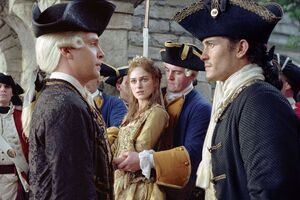
Marked by his failure to deliver to Lord Penwallow the promised cargo, Cutler Beckett's quest for a title was now seriously slowed down. But despite this temporary setback, he continued to serve the Company as before, because he wasn't a man who would give up so easily. Some time later, while he was in England, he met Weatherby Swann, the good friend of King George I.[20]
After years of hard work, Beckett rose through the high ranks of the Company and was became a senior officer and supreme head of the Company by the Court of Directors. Soon, he was both knighted and made a lord,[21] eventually becoming the duly appointed representative of King George II. Lord Beckett quickly made use of his newfound power and status to act on his long-standing prejudice against pirates. And knowing that the removal of piracy from the world forever would require having complete control of the Seven Seas, Beckett began the search for the Dead Man's Chest, which contained the still beating heart of Davy Jones, the supernatural Lord of the sea and captain of the legendary ghost ship called the Flying Dutchman.
At some point during his search, Beckett discovered that Jack Sparrow is alive and in command of the resurrected Wicked Wench, the Black Pearl, as she was called now. He also learned that Jack is in possession of a magical compass that points to what its owner wants most, and that he searched for the cursed treasure of Hernán Cortés that was hidden on Isla de Muerta.
The alliance with Jolly Roger[]
- "Lord Beckett has recruited an army of assassins, and there's no parley with Jolly Roger."
- ―Elizabeth Swann to a pirate
When he arrived in the Caribbean, Beckett discovered that the Company wasn't the only force which wanted to control the New World. The undead army of Jolly Roger, an undead pirate captain, was attacking the main islands in the Caribbean and the ships on the high seas, both the British and the pirate ships. Not wanting to fight on two fronts at the same time, Beckett made a deal with Roger, because they had a common goal, to rid the world of Jack Sparrow. However, when Beckett learned about the magical Lost Weapons of El Patron, a Spanish conquistador who disappeared on a mysterious island called Raven's Cove, he double-crossed Roger and sent the Black Guard to find the weapons. Both Roger's and Beckett's forces landed on Raven's Cove, and fought a bloody battle over the weapons. At the end of the fight, both sides retrieved some of the weapons, and Raven's Cove was in ruins.[15]
Port Royal[]
- "Consider into your calculations that you robbed me of my wedding night."
"So I did. A marriage interrupted...or fate intervenes? You're making great efforts to ensure Sparrow's freedom."
"These aren't going to Jack."
"Oh, really? To ensure Mr. Turner's freedom, then. I'll still want that compass. Consider that in your calculations." - ―Elizabeth Swann and Cutler Beckett
Approximately a year after the incident at Isla de Muerta, Lord Cutler Beckett was sent to Port Royal with the blessing of the Crown and the official appointment to the Royal Commission for Antilles Trade and Protection, which gave him extraordinary powers both governmental and military.[22] Beckett used his arrival in Port Royal to show how powerful he was. Royal Navy ships seal off the harbor. Marines march in step along the dock. Beckett himself was rowed ashore astride a white horse on a longboat,[9][10] having arrived aboard the HMS Endeavour. Having timed his arrival so that he would interrupt William Turner and Elizabeth Swann's wedding, Lord Beckett came bearing arrest warrants for Will, Elizabeth and former commodore James Norrington, all of whom had been implicit in Jack Sparrow's escape from Fort Charles. However, months prior to Beckett's arrival, Norrington had resigned his commission, after his failed attempt to capture Sparrow, but Beckett was able to have Elizabeth and William arrested.[2]
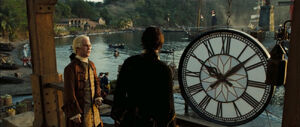
Beckett bargains with Will Turner to retrieve Jack's compass.
Despite the objections of his old acquaintance, Governor Weatherby Swann, Beckett arrested both Will and Elizabeth on their wedding day while accompanied by a troop of East India Trading Company militiamen. However, despite Elizabeth being imprisoned, Beckett struck a deal with Turner; he wished to obtain Jack Sparrow's compass, with which he hoped to find the Dead Man's Chest, which contained the heart of Davy Jones. With the heart he would be able to assume control over Jones and the crew of the Flying Dutchman, and thus the Seven Seas. In return, Beckett promised to pardon Will and make Jack a privateer under the employ of the British crown, with the use of letters of Marque signed by King George II. Will agreed, and set off to locate Jack.[2]
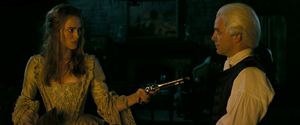
Elizabeth Swann with Cutler Beckett.
Some time later, Beckett was tipped off that Governor Swann was sending Elizabeth back to London. Realizing that Elizabeth was the only thing holding Will to their bargain, Beckett sent Mercer to kill the captain of the vessel that was to transport Elizabeth to England, and to ambush the governor. While this was going on, Beckett was confronted in his office by Elizabeth, who had snuck away from her father prior to the ambush, and stole the letters of Marque from Beckett's desk. Held at gunpoint Beckett was forced to sign and legitimize the letters for Elizabeth and watch her escape. He anticipated Elizabeth's movements, and sent Mercer to head her off at her most likely destination: the pirate port of Tortuga.[2]
Shortly after Elizabeth left, Beckett's men captured a notorious French pirate, Capitaine Chevalle. Beckett had Chevalle tried and set him in stockades in the middle of Fort Charles. Before Chevalle's hanging could commence however, Jack Sparrow snuck into Port Royal to set him free. Sparrow sabotaged the hangman's rope, and then used a series of explosions to cover his and Chevalle's escape from the fort. Unable to recapture Chevalle or Sparrow, Beckett returned to his search for the Dead Man's Chest.[23]
Control of the seas[]
- "Beckett wants the compass. Only one reason for that."
"Of course. He wants the chest." - ―Joshamee Gibbs and Jack Sparrow
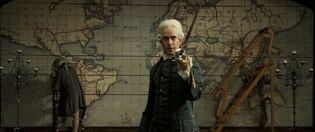
Beckett confronting Weatherby Swann in his office.
Beckett later had Governor Weatherby Swann brought in to hear Mercer's report that Elizabeth had left Tortuga with Jack Sparrow on the Black Pearl, along with James Norrington. Beckett told Swann—who had been imprisoned for his actions—that his armada would soon catch the Pearl and dispense justice. Swann, ignorant of the fact that the Black Pearl was almost uncatchable, accepted Beckett's demands for his loyalty, in return for Elizabeth's safety.[2]
- "If you intend to claim these, then you must have something to trade. Do you have the compass?"
"Better...the heart of Davy Jones." - ―Cutler Beckett and James Norrington
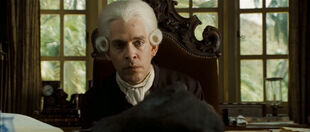
Cutler Beckett being given the heart of Davy Jones.
Ultimately, Lord Beckett received the contents of the Dead Man's Chest from James Norrington. Norrington had stolen Jack Sparrow's letters of Marque, who in turn, had taken them from Elizabeth. Seeking to regain his honor, Norrington fought for the heart of Davy Jones with Jack Sparrow and William Turner, and was able to escape from Isla Cruces, and was picked up by a Company ship. With both the letters and the heart, Beckett not only pardoned Norrington, but promoted him to the rank of admiral. With the heart of Davy Jones in his possession, Beckett was now one step closer to his goal of eradicating piracy from the seas forever.[2]
War Against Piracy[]
- "The Brethren know they face extinction. All that remains is for them to decide where they make their final stand."
- ―Cutler Beckett to Ian Mercer and James Norrington
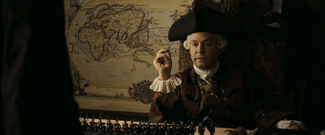
Cutler Beckett aboard the HMS Endeavour.
With the heart in his possession, Beckett employed Admiral James Norrington, and used Davy Jones to hunt down, capture and exterminate piracy from the Caribbean. During this period, in order to catch and execute pirates and their accomplices more quickly, Beckett declared martial law as the duly appointed representative of His Majesty the King. He suspended many rights of ordinary citizens, including the right to a verdict of a jury of peers, the right to legal counsel, the right to gather in protest and several others. Using the authority of Governor Swann, Beckett oversaw the executions of hundreds of people who he believed had even the remotest association with piracy, including children. During one execution, Beckett was able to get the crowd to sing the anthem of the Brethren Court––a clandestine association of notorious pirates––a sign he knew would force the Brethren to meet, at which time he could attack and eliminate them with one fell stroke.[6]
Control of the Dutchman[]
- "The Dutchman sails as its captain commands."
"And its captain is to sail it as commanded. I would have thought you'd learned that when I ordered you to kill your pet. This is no longer your world, Jones. The immaterial has become...immaterial." - ―Davy Jones and Cutler Beckett
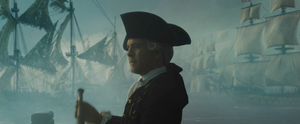
Cutler Beckett with his armada.
As this war progressed, Beckett was intent on finding the crew of the Black Pearl. He apparently was able to have them tracked to Singapore, where Mercer led a detachment of Company troops to find the hideout of the infamous Chinese pirate, Sao Feng. Beckett had placed a spy in Sao Feng's organization, named Steng, who was able to lead Mercer to Feng's bath house. Mercer ambushed the pirates, but wasn't able to capture Feng, or the crew of the Pearl. Mercer reported that Steng had said that the pirates were gathering, and that nine Pirate Lords would be attending, including Jack Sparrow, who was being rescued by his crew from Davy Jones' Locker. Beckett still desired to know the significance of the nine pieces of eight, of which their spy knew very little. However, Mercer told Beckett of a secret deal he made with Sao Feng: Feng would capture the crew of the Pearl and Sparrow would be delivered to Beckett for interrogation, and in turn Feng would be given the Pearl, a clause Beckett had no intention of fulfilling.[6]
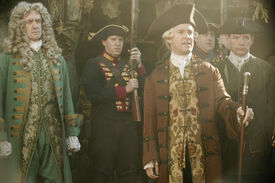
Cutler Beckett with Mercer and Weatherby Swann onboard the Flying Dutchman.
With the Flying Dutchman under its command, the Company easily obliterated numerous pirate vessels. However, Beckett soon became irritated with Davy Jones' habit of leaving no survivors for him to interrogate. Beckett already forced Jones to beach the Kraken, so that it could not be used against him; now he would need to keep Davy Jones within an arm's reach. Beckett placed Admiral Norrington onboard the Dutchman with the Dead Man's Chest, with mini-cannons pointed at the chest at all times. With the chest in constant danger, Jones was forced to obey Beckett's commands to the letter. Soon after that, Beckett ordered Governor Swann to be murdered, fearing that he would soon figure out the significance of the chest, and pose a threat to his plans. However, Beckett attempted to keep the matter secret, and informed individuals, such as Swann's associate Admiral Norrington, that the Governor had been "sent back to England".[6]
Just Good Business[]
- "Curious. Your friends appear to be quite desperate, Jack. Perhaps they no longer believe that a gathering of squabbling pirates can defeat the Flying Dutchman. And so despair leads to betrayal. But you and I are no strangers to betrayal, are we?"
- ―Cutler Beckett to Jack Sparrow
After the Pearl came back from the Locker, Sao Feng made true to his bargain, and captured the Pearl, through a deal he made with Will Turner. He then defaulted on his deal with Turner, in favor of his deal with Beckett. Beckett then intercepted Sao Feng and the Pearl in his flagship, the HMS Endeavour.
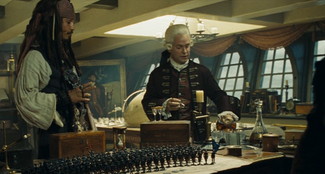
Beckett trying to get information out of Jack Sparrow.
Beckett tried to gain information from Sparrow, while interrogating him in his quarters, even recounting their past dealings with each other to which they are both still scarred by;[14] but Jack apparently holds no grudge against Cutler for the latter's perceived betrayal when the former released the slaves from all those years back, even gratified with the director's conduct as his becoming a pirate when Beckett branded him as such lead to Jack pursuing better opportunities in life. Opportunities that Jack certainly would not have been able to explore had he remained as Beckett's lackey.[citation needed] Sparrow's inordinate terms reminded Beckett of Sparrow's compass, the use of which would render Sparrow unnecessary. Sparrow, however, pointed out that since Beckett wanted Sparrow dead more than anything in the world, Jack's compass would only lead to Sparrow and will keep on doing so until the pirate is actually dead. When Beckett suggested killing Sparrow to "cut out the middle man", Sparrow pointed out that if Beckett simply killed him, he would then find the meeting place of the Brethren Court, Shipwreck Cove, but he would have to blockade the island to a stalemate, ensuring that the pirates taking refuge there could not escape but likewise would also prevent Beckett's forces from approaching further into the cove, and spend countless resources in the process. Sparrow proposed that Beckett release him, so that he could lead Beckett to Shipwreck Cove, and draw the pirates out.[6]
A contemplating Beckett slowly agreed, but at that same moment, Sao Feng joined forces with Hector Barbossa—after learning that he would not be receiving the Pearl after all—and attacked the Endeavour. Sparrow ran out of Beckett's office and cleverly used a cannon and a rope to get back onto the Pearl. Beckett ordered Jones to pursue Sao Feng's ship, the Empress, so that the Endeavour could follow the Pearl. The Endeavour was unable to pursue the Pearl at first, however, due to the fact that during his escape, Jack Sparrow had disabled the main mast of the Endeavour, crippling the vessel for several hours.[6]
- "Jack has sailed the Black Pearl to Shipwreck Cove."
"And with you no longer aboard her, how do you intend to lead us there?"
"[holds up Jack's compass] What is it, that you want most?" - ―William Turner and Cutler Beckett
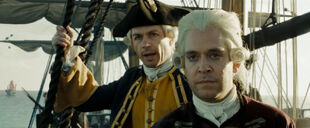
Lieutenant Groves and Beckett on the Endeavour.
When repairs had been made, the Endeavour headed off in the general direction of the Pearl, hoping to catch up to Sparrow. Interestingly enough, a trail of bodies tied to barrels was leading them closer to the Pearl. One night, a barrel had a living body on top of it. When pulled to the deck, Beckett came face to face with the man who had made the trail of bodies in the first place, Will Turner. Will had been thrown overboard by Sparrow, and had come to treat with Beckett. As he had tea with Turner, Davy Jones was summoned. Jones was upset with Beckett for not telling him that Sparrow had been freed from the Locker and suspected that he was hiding other information from him as well. Beckett ignored Jones' suspicions, and instead questioned Jones about Calypso, the goddess of the sea, according to nautical legend. Beckett had been told that the pirates possessed Calypso, and he wanted to see if Jones knew anything about her, knowing that, as Jones had sailed the seas for hundreds of years, he would no doubt have heard the "legend". Beckett was surprised to find that Jones himself had made a deal with the original Brethren Court to bind Calypso in human form. Will then told them that the Brethren Court intended to release her, and offered to lead Beckett and Jones to Shipwreck Cove, all in return for his father's freedom and the guarantee of his and Elizabeth's safety. Beckett agreed, and Will gave Beckett Jack's compass, which was able to lead him to Shipwreck Cove.[6]
Prior to his arrival at Shipwreck Island, Beckett sent a small force of Company soldiers, under the command of his elite Black Coat soldiers, to attack the Pirate Lords in Shipwreck City. Inevitably, the small contingent of Company troops was defeated, but Beckett had only meant to delay the pirates from escaping, while he organized his armada against them.[23]
Parlay with the Pirates[]
- "Advise your Brethren: you can fight, and all of you will die, or you can not fight, in which case only most of you will die."
- ―Cutler Beckett to King Elizabeth Swann.
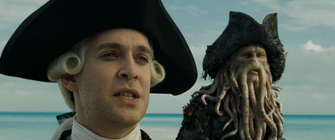
Cutler Beckett and Davy Jones on the sandbar.
True to his word, Sparrow had indeed led the Brethren out of their fortress, and offshore of Shipwreck Island, Beckett's armada came face to face with the fleet of the Brethren Court. The pirates were outnumbered ten to one, and Beckett was as confident as ever of his victory. He rowed over to a sandbar in between the two fleets, along with Davy Jones and Will. The three men waited for the arrival of the Court's ambassadors. Finally, Elizabeth Swann, Hector Barbossa and Jack Sparrow strode up the sandbar to them. Beckett told them that they could either surrender or fight, and in the latter case they would all die. Elizabeth rebuked Beckett, and seemed confident in the capabilities of her own small fleet. Although Will told Elizabeth he was the one who had lead Beckett to Shipwreck Cove, Beckett was convinced that Sparrow was really behind it all. Beckett revealed to the pirates the deal he had made with Jack, and tried unsuccessfully to get him to confess. Nevertheless, Elizabeth offered to trade Jack for Will, to which Beckett happily agreed. Beckett rowed back to the Endeavour, and ordered his men to ready the fleet.[6]
- "The enemy...has opted for oblivion. Ready the fleet."
- ―Cutler Beckett
As preparations were being made for the battle, an odd wind began to blow in the favorable direction of the pirate fleet, and the skies darkened and rain began to fall. As lightning struck the surface of the water in front of Beckett's fleet, a colossal maelstrom began to form. Beckett saw that the Pearl was heading towards the maelstrom, and ordered the Dutchman to do the same, signaling it to attack the Pearl and to give no quarter. Confident of his superiority, Beckett sent only the Flying Dutchman to attack the pirates.[6]
Death[]
- "It's nothing personal, Jack. It's just good business."
- ―Cutler Beckett
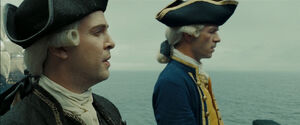
Following the end of the battle of the maelstrom, and the apparent sinking of the Flying Dutchman, the Black Pearl emerged victorious from the massive whirlpool. After Lieutenant Groves saw the Pearl just waiting between the two fleets, Beckett, a little bit worried that his advantage is lost, commanded the Endeavour to finish the Pearl off, disregarding his deal with Sparrow. However, as he closed in on the Pearl, the Flying Dutchman reemerged from the depths. Beckett did not know that Will Turner had stabbed the heart of Davy Jones, and had taken his place as captain of the Flying Dutchman.[6]
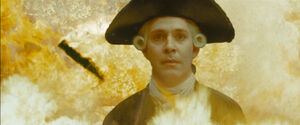
Beckett during the destruction of the Endeavour.
As the Black Pearl and the Flying Dutchman rounded about and closed in on the HMS Endeavour, Beckett was paralyzed with a mixture of fear, shock, doubt, and indecision, unable to give any of his men a single order. Nervous, Lieutenant Groves was concerned about what Beckett's orders were in the turn of events in which the Pearl and the Dutchman flanked the Endeavour on both sides. Another officer then came to ask Beckett for orders as both ships fired a full broadside. Unfazed, Beckett stated his previous musing to himself, with resignation, disgust and amazement: "It's just good business." Because Beckett still did not give an order, Groves ordered the entire crew of the Endeavour to abandon ship, and then jumped overboard. While Beckett still stood in shock, knowing that he would meet his end, the crew of the Endeavour either jumped overboard or were killed in the blasts.[6]

Lord Cutler Beckett's dead body.
Beckett, defeated and utterly helpless, calmly walked down the staircase from the helm to the quarterdeck of the Endeavour as the ship was being obliterated all around him. Oddly enough, as he walked towards the center of his ship, not a single large piece of metal or wood hit him. But finally, Beckett's life ended when the constant barrage of fire from the two ships ignited the Endeavour's powder magazine, sending his ship up in flames. His body was blown overboard and landed atop a floating East India Trading Company flag.[6]
- "It's just...good business."
- ―Cutler Beckett's last words
Personality and traits[]
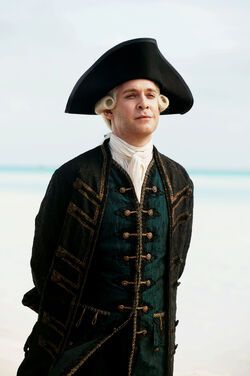
Cutler Beckett
- "No doubt you've discovered that loyalty is no longer the currency of the realm, as your father believes."
"Then what is?"
"...I'm afraid currency, is the currency of the realm." - ―Cutler Beckett and Elizabeth Swann
Cold, calculating and utterly ruthless,[8] Cutler Beckett was a loyal subject of the British Empire as the senior officer[7] and supreme head of the East India Trading Company. He would be delighted to change the company's name to the East and West India Trading Company, but he knew that he could make no progress until he had stamped out the scourge of piracy.[9][24] Cutler Beckett was a manipulative, mean-spirited and arrogant man, who would stop at nothing to further his own personal goals. He believed that currency, rather than loyalty, was the currency of the realm.[1][2] Beckett had great ambitions for the company and had a map of the world painted on his office to illustrate them. To further the achievements of the company he aims to rid the seas of piracy by finding the Dead Man's Chest. Then he can control Davy Jones himself, and rule every ship, sailor, and creature of the Seven Seas.[8][9][25] A persistent man, Beckett felt no remorse for the deaths he caused, as he showed when he sent hundreds of possibly innocent people, who he believed to be associated with piracy, to the gallows, even children.[6] He utilized his assistant, Ian Mercer, to the fullest of his abilities, using him as both an assassin and spy. Beckett was adept at twisting the law for his own aims, using his status as a representative of King George II to manipulate Elizabeth Swann, Will Turner, and James Norrington to find the Dead Man's Chest.[2] Beckett viewed others as tools, and showed blatant disregard for the lives of others around him.[2][6] He was also quite unconcerned with dangerous, even life-threatening situations, remaining calm during an attack on the Endeavour, as cannonballs streaked past him; he even maintained a relaxed disposition when Elizabeth held him at gun point and was not remotely abashed when Cutler did the same to Jack when he concluded that killing the pirate would shift personal desire from seeing Jack Sparrow dead to finding the Shipwreck Cove, leading the East India Trading Company's forces to there via the guidance of Jack's compass. Even prior to his death, he remained calm, for the most part, as his ship was helplessly obliterated all around him.[6]
Perhaps Beckett's most uncharacteristic attribute was his seeming interest of Elizabeth Swann. Perhaps, like the pirate Sao Feng,[6] Beckett was intrigued by her outgoing and assertive personality,[2] contrary to the reserved personalities of most women at the time. Ultimately, however, she had no bearing on his decisions to attack the Black Pearl and the fleet of the Brethren Court; although, at one point he did half-heartedly try to coax Jack Sparrow into giving Elizabeth over to him during their negotiations aboard the Endeavour. Nevertheless, Beckett remorselessly had Elizabeth's father murdered, and seemed unfazed when she confronted him about it.[6] Beckett also had no qualms with revoking on deals with those he did business with, disregarding secret agreements he made with a range of people, including Weatherby Swann, Will Turner, Sao Feng and Jack Sparrow.[6] Ironically his attempt to renege on his deal with Sparrow led to his death as he brought his ship out into the open, allowing the Black Pearl and Flying Dutchman to destroy it. Despite his familiarity with betrayal, or perhaps because of it, Beckett paid those who betrayed him in kind,[13] and rewarded those who served him faithfully.[6]
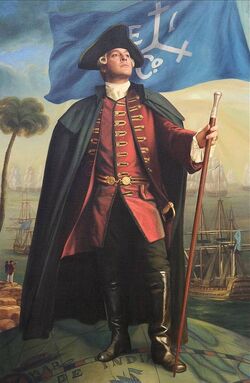
Culter Beckett's portrait.
- "Jack Sparrow is a dying breed. The world is shrinking. The blank edges of the map filled in. Jack must find his place in the New World or perish."
- ―Cutler Beckett to William Turner
Beckett's actions throughout most of his life were driven by his intense hatred of pirates. The majority of his policy while chairman of the East India Trading Company involved confronting the issue of piracy across the globe.[6] Because of his terrifying experience with the pirate crew of Christophe-Julien de Rapièr, he hated pirates more than anything. As chairman of the EITC, he saw piracy as a major threat to commerce, especially the financial interests of the Company. However, Beckett possessed a very keen vision for a new world order, and he believed that the romantic age that pirates such as Jack Sparrow once belonged to had come to an end. He further believed that if pirates could not find their place in the dawning age of global commerce they would perish, either through the natural course of social evolution,[2] or preferably, by his own designs.[6] It's also likely that Beckett's hatred for all pirate-kind was seated in his deep-rooted hatred and sense of rivalry with Jack Sparrow, a man who betrayed him to become a pirate.[2]
Like many people of his time, Beckett had nothing against slavery. For him, selling the black Africans as slaves was just another good business. While he was living in Calabar, he owned several slaves, either to keep his house clean, or to drive his expensive carriage. As the EITC Director of West African Affairs, he was in charge of overseeing the sales inventory carried by hundreds of EITC vessels, and the most valuable African EITC cargo were slaves. Though he didn't exactly consider the black people inferior to the whites, and he even admitted that slave trade wasn’t a pleasant business, it was extremely lucrative, which was for him a good enough reason to get himself involved in it.[3]
By his own admission, Beckett wasn't a religious man, and he didn't believe in God at all, reason for which he opted not to become a cleric when he grew up.[16] However, he considered himself an English patriot, and he felt that his duty to his country and his King was to expand the power of the East India Trading Company whenever possible, because whenever the Company's power would grow, the power of England would grow too. Beckett also believed in the virtues of a healthy constitutional each day. While he lived in Calabar, it was his custom to walk to the docks for exercise, or to ride one of his horses if he had an errand outside of the main part of town.[3]
Beckett possessed a number of various outfits. Most were dark colored, perhaps reflecting his sinister goals. All of them were elegant, however, and as Beckett valued personal wealth and beauty, he wore them to show others his high status and wealth. He always wore tall black boots and a powdered white wig perfectly coifed, giving him an air of authority. Beckett also wore a tricorne hat and, occasionally, an Inverness cape when outside, especially in rainy weather.[2][6]
Equipment and skills[]
- "Our ships are in pursuit, and justice will be dispensed by cannonade and cutlass, and all manner of remorseless pieces of metal. I personally find it distasteful to even contemplate the horror facing all those on board."
- ―Cutler Beckett to Weatherby Swann
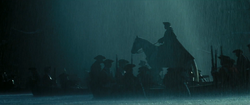
Cutler Beckett arrives in Port Royal on his horse.
Beckett owned and used a variety of items and weapons during his service in the East India Trading Company. Perhaps most impressive of all, was the world map he had painted in his Port Royal office. A cartographer was employed to make daily changes to the map as ships returned bringing reports of the Company's growing power and influence.[2] Beckett also maintained a large globe in his cabin aboard the HMS Endeavour.[6] Also aboard, were various nautical instruments and toy ships that eerily resembled torture devices, perhaps reflecting the type of control Beckett planned to exert over the world.[26] He owned a golden signet ring which he used to seal letters and important documents.[2] Beckett also possessed a silver-topped walking stick which he used sparingly, but nevertheless used it to emphasize his status.[6] Interestingly enough, Beckett also owned a horse, which he rode on while being rowed into Port Royal upon his arrival in the Caribbean.[2][9][10]
Beckett made many enemies during his rise to power, and took to carrying a pistol at all times. This short-barelled weapon was kept in a specially-made pocket in the lining of his frock coat.[9][10] He also owned a cutlass and took possession of James Norrington's sword upon taking control of Port Royal.[2] Despite the fact that Beckett rarely carried his cutlass with him, he was nevertheless highly trained in swordplay, and considered himself a very skilled duelist.[23]
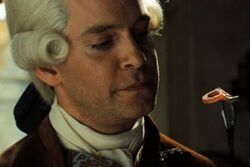
Beckett holding a pirate brand.
During his campaign to eradicate piracy, Beckett made use of a pirate brand. This branding iron was tipped with a "P", which was pressed, boiling hot, onto the forearm of captured pirates, leaving them permanently scarred. Beckett kept this brand in his office. Upon journeying to the Caribbean, Beckett brought with him Letters of Marque, signed by the King himself, intending to use them in his plan to assume control of the Dead Man's Chest. The chance to become a privateer was offered to Jack Sparrow, though the letters were ultimately signed and claimed by James Norrington, in exchange for the heart of Davy Jones.[2]
Beckett was highly educated, and as such, he was able to speak several languages. Aside from English, which was his native language, he fluently spoke French, Spanish, Greek, and Latin.
Behind the scenes[]
- "Soft glove, hard fist. On the outside, he's very arrogant and charming, but the inside is incredibly hard. There's a modern parallel to how Lord Cutler Beckett and the East India Company operates in the story, with the pirates—who symbolize absolute freedom—being squeezed out ruthlessly. Especially Jack Sparrow, who in Beckett's view is naughty, messy, has dreadlocks, could do with a few more baths and, worst of all, is a pirate. To Cutler Beckett, Jack Sparrow is a stray dog."
- ―Tom Hollander
- Cutler Beckett was first identified in the 2006 reference book Pirates of the Caribbean: The Visual Guide,[9] which would later be in the 2007 reprint Pirates of the Caribbean: The Complete Visual Guide,[10] before first appearing in the junior novelization for the film Pirates of the Caribbean: Dead Man's Chest,[1] where he was portrayed by Tom Hollander.[2] Hollander reprised the role in At World's End[6] and its video game adaptation.[23] Archived audio of Hollander was used for Sea of Thieves: A Pirate's Life.[27] Mick Wingert voiced Cutler Beckett in Kingdom Hearts III.[28]
- Lord Cutler Beckett's arrival at Port Royal at the beginning of Dead Man's Chest, mounted on his horse aboard a rowboat, was taken from an idea screenwriters Ted Elliott and Terry Rossio had for the 1997 film The Mask of Zorro. Don Rafael Montero, the villain in Zorro, was to be introduced mounted on his horse aboard a rowboat, but the idea was considered "too expensive" and was scrapped. For Dead Man's Chest, Elliott and Rossio thought they'd try again to include the introduction of a character riding to shore on a horse in a boat. First they tried to cut it because it was too unbelievable, with the note from a historian was, "Riding on a horse in a small boat is suicidal! It would never be done!" Then they tried to cut it for budget reasons, but director Gore Verbinski opted to use the idea for Beckett's introduction in Dead Man's Chest.[29]
- In Ted Elliott and Terry Rossio's screenplay for Dead Man's Chest, as Lord Cutler Beckett hands several documents to Governor Wetherby Swann as he lists them, then states his "appointment to the Royal Commission for Antilles Trade and Protection. The Commission charter, granting it extraordinary powers in matter both governmental and military." Adding the warrant for the arrest of William Turner and Elizabeth Swann, as well as the charges against Will and Elizabeth. In the scene where Will asks Beckett what the East India Trading Company was doing in the Caribbean, Beckett indicates the world map on the wall of his office and responses, "It would not be in the best interests of the Empire to be bound by matters of geography, would it? After all, when goods do not cross borders, armies will." The character was later referred to as "Sir Cutler Beckett" once by Elizabeth. After James Norrington relinquished the heart of Davy Jones to Cutler Beckett, Beckett presented Norrington with his sword, immediately reinstating him in the Royal Navy and promoted to admiral, after which Davy Jones arrives to Port Royal aboard the Flying Dutchman and the Artisan notifies Beckett that the map was finished.[30] The scenes play out differently in the final cut of the film, though some were retained in the film's junior novelization.[1] Although the line about the charges against Will and Elizabeth was ultimately given by Jonathan Pryce as Governor Swann in the final cut, Tom Hollander as Lord Beckett accidentally delivered the line in at least one take, in a moment featured in the "Bloopers of the Caribbean" special feature.[31] Beckett's scenes were retained in the deleted scenes featured in Blu-ray releases beginning in 2011.[32][33][34]
- In Ted Elliott and Terry Rossio's first screenplay draft of At World's End, Cutler Beckett obtained one piece of eight, Magellan's signet ring, from Capitaine Chevalle, years ago in the game of cards in the South China Seas. He later used it as his signet ring and sealed Letters of Marque with it.[35]
- In a late production draft for At World's End, titled Calypso's Fury, the character was referred to as "Sir Cutler Beckett" once at the beginning. Lord Cutler Beckett had more scenes aboard the Flying Dutchman, in which Governor Swann and Admiral Norrington learn what happens if Davy Jones' heart was stabbed as well as Elizabeth being alive. Jack Sparrow and Cutler Beckett had more lines of dialogue in the captain's cabin of the Endeavour, including Sparrow saying "people aren't cargo" after Beckett briefly tells about seeing the Black Pearl again. During the parley on the sandbar, Beckett talks about Jack's "ulterior, ulterior motive" being Elizabeth. Also, Beckett's last words were "Who am I?" instead of "It's just... good business" prior to the Pearl and the Dutchman opening fire on the Endeavour. Also, he was not going to walk on the main deck of the Endeavour before it exploded, as the destruction of the Endeavour was much shorter than in the finished version of the film. He was to survive the Endeavour's explosion, but then drown when the large EITC flag fell in the water over him.[36] The scenes play out differently in the final cut of the film, though some were retained in the film's junior novelization,[14] Beckett's scenes were retained in the deleted scenes featured in Blu-ray releases beginning in 2011.[37][38][39][40][41]
- In the At World's End video game, Beckett's death doesn't occur as it happens in the film. He is presumably killed off-screen when the Flying Dutchman and the Black Pearl fire at the HMS Endeavour until it sinks. It should be noted that instead of "It's just... good business" being his last words, as per the film, his last words in the game are different. In the older console version, Beckett's last words are "We witness the end of piracy and the end of Jack Sparrow. Has there ever been a more glorious day!" whereas the newer console version has the same line, but instead having him say, "Has there ever been a sweeter day!"
- In Terry Rossio's original screenplay draft for Dead Men Tell No Tales, the young girl Cora June meets Jack Sparrow, telling him about the many stories about him, including one which said that he was involved in a plot to murder Beckett. Much later in the story, Beckett himself would have appeared in one of Jack Sparrow's hallucinations, reminding him that currency was the currency of the realm before laughing and have crabs emerging from his bloated corpse, leading Jack to push him away.[42]
- Cutler Beckett had a special theme made for him by composer Hans Zimmer. It was part of the unreleased soundtracks of Pirates of the Caribbean: Soundtrack Treasures Collection.
- In Pirates of the Caribbean Online, a silver mine on Padres Del Fuego was called Beckett's Quarry.
- In 2007, to coincide with the release of At World's End, Mega Bloks released a set named Danger from the Depths, which included the Kraken and figures of Jack Sparrow (covered in Kraken's green drool) and Cutler Beckett. As this scene never occurs in the actual film (and considering the fact that the Kraken is already killed by that time), it's unknown if this is a false labeling or not.
- In 2008, Zizzle released an action figure of Cutler Beckett for their Pirates of the Caribbean toyline. Beckett's action figure was packaged with a sword, a pistol, and a hat. The toy, however, saw a limited release and became highly sought after. It's now almost impossible to get, making Beckett the rarest Pirates of the Caribbean figure. Also, like the films' screenplays, the character is named "Sir Cutler Beckett" in the description for the Admiral Norrington action figure for At World's End.[43]
- In LEGO Pirates of the Caribbean: The Video Game, Beckett is depicted as a shorter man. It's unknown whether this was a mistake or not, but it should be noted that Tom Hollander is also not that tall himself either, with a height of 5.5.f. Another interesting fact about Beckett is that he is the only main antagonist of a Pirates film to have not been released in an actual LEGO Pirates of the Caribbean set.
- A portrait of Lord Cutler Beckett can be seen in the 2012 attraction The Legend of Captain Jack Sparrow.[44]
- Cutler Beckett was meant to appear in Pirates of the Caribbean: Armada of the Damned, a video game which was scheduled to be released in 2011.[45] But since that game was cancelled, it is unknown if his appearance in the game is canon or not.
Appearances[]
- The Legend of Captain Jack Sparrow (in a portrait)
- The Price of Freedom
- Pirates of the Caribbean: Armada of the Damned
- The Compass of Destiny! (Mentioned only)
- Pirates of the Caribbean Online (Mentioned only)
- Pirates of the Caribbean: Dead Man's Chest
- Pirates of the Caribbean: At World's End
- Pirates of the Caribbean: At World's End (junior novelization)
- Pirates of the Caribbean: At World's End: The Movie Storybook
- Pirates of the Caribbean: At World's End (Penguin Readers)
- Pirates of the Caribbean: At World's End (video game)
- Pirates of the Caribbean: At World's End (comic)
- Pirates of the Caribbean Trading Card Game
- Pirates of the Caribbean: Gods and Ghosts M (Non-canonical appearance)
- Kingdom Hearts III (Non-canonical appearance)
- Sea of Thieves: A Pirate's Life (Non-canonical appearance)
Sources[]
- Pirates of the Caribbean: The Visual Guide (First mentioned)
- Pirates of the Caribbean: The Complete Visual Guide
- The Pirates' Guidelines
- Pirates of the Caribbean Annual 2008
Notes and references[]
- ↑ 1.0 1.1 1.2 1.3 1.4 1.5 1.6 1.7 Pirates of the Caribbean: Dead Man's Chest (junior novelization)
- ↑ 2.00 2.01 2.02 2.03 2.04 2.05 2.06 2.07 2.08 2.09 2.10 2.11 2.12 2.13 2.14 2.15 2.16 2.17 2.18 2.19 2.20 2.21 2.22 2.23 2.24 2.25 2.26 Pirates of the Caribbean: Dead Man's Chest
- ↑ 3.00 3.01 3.02 3.03 3.04 3.05 3.06 3.07 3.08 3.09 3.10 3.11 3.12 3.13 3.14 3.15 3.16 3.17 3.18 3.19 3.20 3.21 3.22 3.23 3.24 3.25 3.26 3.27 The Price of Freedom, Chapter Four: "Cutler Beckett"
- ↑ According to Pirates of the Caribbean: The Price of Freedom, Beckett is said to be "somewhat older" than Jack Sparrow. It is not stated how much exactly, but it is said that at this point in time Cutler Beckett worked for EITC for "almost a decade" - this remark was however written just after he moved to his new post in Calabar which happened 5 and a half months before he met Jack for the first time. The timeline established by Dead Men Tell No Tales (which takes place in 1751) sets Jack Sparrow's birth around the year 1690 which when we consider that Cutler started working for EITC when he was 18, sets Beckett's birth around 1687. In the same novel it was also said that he was "not yet 8 years old" in the late spring, supposedly in the flashback of the year 1695, which may indicate that he was born in the summer or later.
- ↑ James "Jim" Carson's calendar of Henry Turner's waiting for Will Turner's return from Dead Men Tell No Tales shows that Will Turner's first visit to his family after ten years of captaining the Flying Dutchman, which is shown in the after credits scene of At World's End, occurred in August 1739, which means Beckett's death occurred in August 1729.
- ↑ 6.00 6.01 6.02 6.03 6.04 6.05 6.06 6.07 6.08 6.09 6.10 6.11 6.12 6.13 6.14 6.15 6.16 6.17 6.18 6.19 6.20 6.21 6.22 6.23 6.24 6.25 6.26 6.27 6.28 6.29 Pirates of the Caribbean: At World's End
- ↑ 7.0 7.1 Pirates of the Caribbean Annual 2008, p. 54
- ↑ 8.0 8.1 8.2 POTC2 Presskit
- ↑ 9.0 9.1 9.2 9.3 9.4 9.5 9.6 9.7 Pirates of the Caribbean: The Visual Guide
- ↑ 10.0 10.1 10.2 10.3 10.4 10.5 Pirates of the Caribbean: The Complete Visual Guide, pp. 44-45: "Lord Beckett"
- ↑ The Price of Freedom, Chapter Nineteen: Freedom's Price
- ↑ 12.0 12.1 12.2 12.3 12.4 12.5 12.6 The Price of Freedom, Chapter Eleven: "Pirates and Rogues"
- ↑ 13.0 13.1 13.2 13.3 13.4 13.5 13.6 13.7 13.8 13.9 The Price of Freedom, Chapter Eighteen: "Exodus"
- ↑ 14.0 14.1 14.2 14.3 Pirates of the Caribbean: At World's End (junior novelization)
- ↑ 15.0 15.1 Pirates of the Caribbean Online
- ↑ 16.0 16.1 16.2 16.3 16.4 16.5 16.6 16.7 16.8 16.9 The Price of Freedom, Chapter Seven: "Lost and Found"
- ↑ The Price of Freedom, Chapter Six: "The Wicked Wench"
- ↑ The Price of Freedom, Chapter Five: "The Lost Princess"
- ↑ 19.0 19.1 The Price of Freedom, Chapter Nine: "Ayisha"
- ↑ The script of Pirates of the Caribbean: Dead Man's Chest implies they met before Weatherby Swann became a governor, when he was still living in England. The timeline established in On Stranger Tides, Dead Men Tell No Tales, and their tie-in materials sets Swann's appointment between 1714 and 1727, during the historical reign of King George I.
- ↑ DisneyPirates.com - Archived
- ↑ Pirates of the Caribbean: Dead Man's Chest (junior novelization), p. 12
- ↑ 23.0 23.1 23.2 23.3 Pirates of the Caribbean: At World's End (video game)
- ↑ Pirates of the Caribbean: The Complete Visual Guide, pp. 48-49: "East India Trading Co."
- ↑ Pirates of the Caribbean: The Complete Visual Guide, pp. 46-47: "Beckett's Plan"
- ↑ At World's End production notes: Chapter 7 - Return to The Bahamas
- ↑ Sea of Thieves: A Pirate's Life
- ↑ Kingdom Hearts III
- ↑ Wordplayer.com: WORDPLAY/Archives/"Caribbean Tales" by Terry Rossio
- ↑ Wordplayer.com: PIRATES OF THE CARIBBEAN: DEAD MAN'S CHEST by Ted Elliott & Terry Rossio
- ↑ Pirates of the Caribbean: Dead Man's Chest - "Bloopers of the Caribbean"
- ↑ Pirates of the Caribbean: Dead Man's Chest Deleted Scene: "East Of India"
- ↑ Pirates of the Caribbean: Dead Man's Chest Deleted Scene: "What Of You And Jack?"
- ↑ Pirates of the Caribbean: Dead Man's Chest Deleted Scene: "The Map Is Finished"
- ↑ PIRATES OF THE CARIBBEAN: AT WORLD'S END by Ted Elliott & Terry Rossio, original draft
- ↑ Wordplayer.com: PIRATES OF THE CARIBBEAN: AT WORLD'S END by Ted Elliott & Terry Rossio
- ↑ Pirates of the Caribbean: At World's End Deleted Scene: "It's A Two-Part Plan"
- ↑ Pirates of the Caribbean: At World's End Deleted Scene: "Swann Song"
- ↑ Pirates of the Caribbean: At World's End Deleted Scene: "It's Just Good Business"
- ↑ Pirates of the Caribbean: At World's End Deleted Scene: "The Thing You Want Most"
- ↑ Pirates of the Caribbean: At World's End Deleted Scene: "Her"
- ↑ Wordplayer.com: PIRATES OF THE CARIBBEAN: DEAD MEN TELL NO TALES by Terry Rossio
- ↑ Pirates of the Caribbean: At World's End - Admiral Norrington action figure
- ↑ The Legend of Captain Jack Sparrow
- ↑ Pirates of the Caribbean: Armada of the Damned
| v • d • eCrew of the HMS Endeavour | |
|---|---|
| |
| [edit] |
| Featured articles | |
|---|---|
| |
| [edit] |

